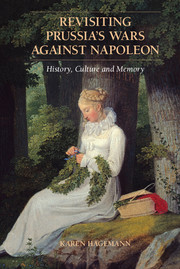Book contents
- Frontmatter
- Epigraph
- Contents
- List of Figures and Maps
- List of Abbreviations
- Acknowledgments
- Revisiting Prussia’s Wars against Napoleon
- Part One A History of Defeat, Crisis and Victory
- Part Two Discourses on the Nation, War and Gender
- Part Three Collective Practices of De/Mobilization and Commemoration
- 8 Military Service
- 9 War Charity
- 10 De/Mobilizing Society
- 11 Honoring and Commemorating War Heroes
- Conclusion
- Part Four Literary Market, History and War Memories
- Part Five Novels, Memory and Politics
- Epilogue Historicizing War and Memory, 2013–1813–1913
- Bibliography
- Name Index
- Subject Index
- Plate section
- References
10 - De/Mobilizing Society
Patriotic-National Celebrations and Rituals
Published online by Cambridge University Press: 05 March 2015
- Frontmatter
- Epigraph
- Contents
- List of Figures and Maps
- List of Abbreviations
- Acknowledgments
- Revisiting Prussia’s Wars against Napoleon
- Part One A History of Defeat, Crisis and Victory
- Part Two Discourses on the Nation, War and Gender
- Part Three Collective Practices of De/Mobilization and Commemoration
- 8 Military Service
- 9 War Charity
- 10 De/Mobilizing Society
- 11 Honoring and Commemorating War Heroes
- Conclusion
- Part Four Literary Market, History and War Memories
- Part Five Novels, Memory and Politics
- Epilogue Historicizing War and Memory, 2013–1813–1913
- Bibliography
- Name Index
- Subject Index
- Plate section
- References
Summary
In his 1810 book German Folkdom, Friedrich Ludwig Jahn presents his extensive suggestions for the formation of a German “folk culture” under the heading “folk sensibility” (Volksgefühl). For him, the “language of signs” spoken by “festivities, ceremonies and customs,” was a “language of the heart,” a “need of man, who recognizes the spiritual more purely in a mediating symbol.” This language comes “to the aid of memory,” because it creates a “lasting effect of constant realization.” Jahn perfectly understood the importance of emotions for the cultural construction of a nation, and the central role that ceremonies, rituals and symbols played in this process. He and many other patriots therefore intensively discussed the development of a patriotic-national festival culture in the context of the debate over the best forms of mobilization for war that began after the defeat of 1806–07.
The suggestions they made for this patriotic-national festival culture were a mix of old traditions and new ideas. Early modern European monarchies had used ceremonies and rituals to display and increase their political power and prestige. The king’s coronation, his birthday or important battlefield victories were typically celebrated with grand festivals. Military parades in splendid dress uniforms became a part of these ceremonies when early modern states introduced standing armies and the drilling of soldiers became commonplace. Churches were often used for state-ordered services of intercession and thanksgiving during and after wars, and eighteenth-century Prussia and Germany were no exception in this regard. In the 1770s and 1780s, however, a novel discourse emerged in Central Europe and elsewhere. Enlightened reformers proposed a refashioning of the public festival culture, which they now understood as part of “national culture.” They believed that such celebrations could be used to foster patriotism and a feeling of national belonging among the population. Revolutionary France was the first state to demonstrate vividly the potential of a state-organized festival culture for national mobilization in the early 1790s, and in the following years it became a model for others, even its enemies.
- Type
- Chapter
- Information
- Revisiting Prussia's Wars against NapoleonHistory, Culture, and Memory, pp. 208 - 227Publisher: Cambridge University PressPrint publication year: 2015



